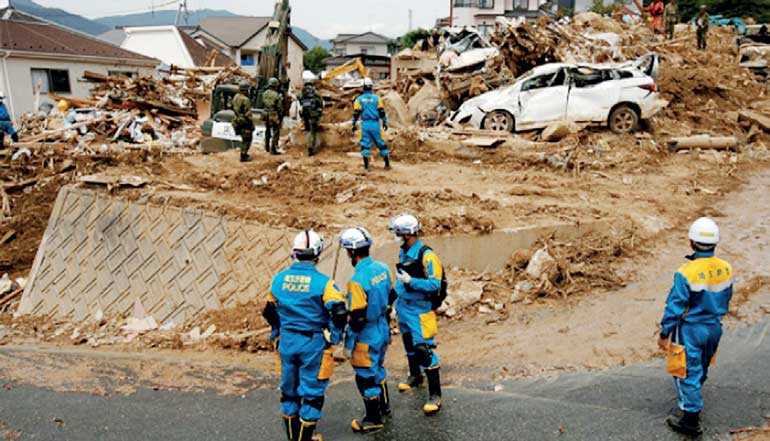Saturday Feb 28, 2026
Saturday Feb 28, 2026
Thursday, 12 July 2018 00:00 - - {{hitsCtrl.values.hits}}

KUMANO, Japan (Reuters): Prime Minister Shinzo Abe visited flood-stricken parts of Japan on Wednesday as the death toll from the worst weather disaster in 36 years reached 176 and health worries increased amid scorching heat and the threat of new floods.
Torrential rain unleashed floods and landslides in western Japan last week, bringing death and destruction in particular to neighbourhoods built decades ago near steep slopes.
At least 176 people were killed, the government said, with dozens missing in Japan’s worst weather disaster since 1982.
Abe, who cancelled an overseas trip to deal with the disaster, was criticised after a photograph posted on Twitter showed Abe and his defence minister at a party with lawmakers just as the rains intensified.
After observing the damage from a helicopter flying over Okayama, one of the hardest-hit areas, Abe visited a crowded evacuation centre. He crouched down on the floor to speak with people, many of them elderly, and asked about their health. He clasped one man’s hands as they spoke.
Abe is up for re-election as party leader in September and has seen his popularity ratings edge back up after taking a hit over a cronyism scandal earlier this year.
His government pledged an initial $4 billion towards recovery on Tuesday, and a later special budget if needed. Rescuers faced a scorching sun as they combed through heaps of wood and thickly caked mud in a grim search for bodies, helped by sniffer dogs. In some cases only the foundation of houses remained as rescuers cut through debris with chain saws. “My younger brother still hasn’t been found. We in the family are coming here to wait in shifts,” one woman told NHK television as she watched over the ruins left by a landslide. With temperatures of 33 degrees Celsius (91 degrees Fahrenheit) or higher predicted for the devastated areas in Okayama and Hiroshima prefectures, attention turned to preventing heat-stroke among rescue workers and in evacuation centres where thousands of people sought shelter. People sat cross-legged on thin mats on a gymnasium floor in one centre, plastic bags of belongings piled around them and bedding folded off to the side. Portable fans turned slowly as children cried.
Officials turned to social media to warn of the additional danger of food-borne illnesses, urging people to wash their hands and take other measures against food poisoning.